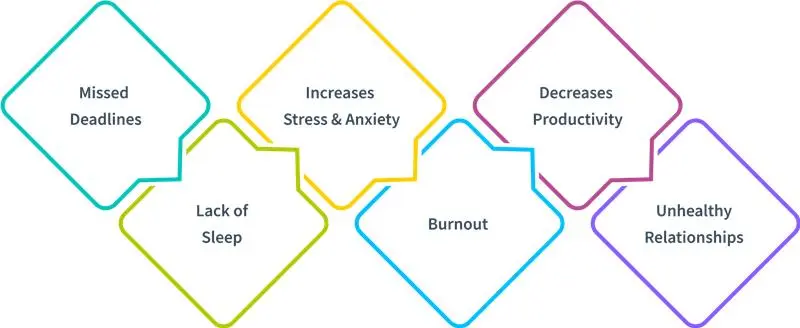Ever wonder where the day went, and why your to-do list somehow got longer instead of shorter? You’re not alone. Without a clear plan, time can feel like it’s slipping through your fingers, leaving you stressed and overwhelmed. But what if you could flip the script and make time work for you instead of against you?
This blog will show you how to create a simple time management plan in just 6 easy steps with tips that anyone can use to get organized, focused, and productive. Ready to change how you manage your time forever? Let’s dive in!
What is Time Planning?
Time planning is the process of organizing and scheduling your tasks and activities in advance to make the best use of your available time. It helps you prioritize important responsibilities, set realistic deadlines, and create a structured plan to achieve your goals efficiently and reduce stress.
Why is a Time Management Plan Important?
A time management plan isn’t just about making a to-do list, it’s a thoughtful way to organize your day so you can stay focused, lower your stress, and make consistent progress toward your goals. Without some kind of plan, it’s easy to lose sight of what really matters or waste time on things that don’t add much value.
When you plan your time well, you can clearly see your priorities and direct your energy to where it counts. This not only helps you get more done, but it also gives your day a better structure. Instead of constantly reacting to whatever comes up, you’re taking charge and working with purpose. That alone can ease a lot of stress, since you’re not always scrambling to catch up or make last-minute decisions.
For instance, consider an employee managing daily tasks, team meetings, deadlines, etc. Without any proper time plan, he might struggle to keep up, work overtime, and feel overwhelmed. But with a simple time management schedule, he can keep up with these tasks, attend meetings, and still have time to recharge.
A solid time management plan also helps you find a better balance. When you schedule time for work and personal activities, you are able to focus on everything you do.
6 Basic Steps to Develop Your Time Management Plan
Yes! All you need to know is about these 6 steps of an effective time management plan to help you stay organized, manage your tasks better, and make the most of your time every day.

1. Set a SMART Goal
The foundation of any time management plan is knowing exactly what you're working toward. Start by setting a SMART goal, one that is Specific, Measurable, Achievable, Relevant, and Time-bound.
For example, instead of saying “I want to be more productive,” a SMART goal would be “I want to complete three major projects in the next 30 days.” This type of clear goal gives your schedule direction and helps you stay motivated.
2. Prioritize Your Tasks
Not every task deserves your time a lot. So, it is important to prioritize your tasks based on their importance. Make sure to focus on tasks that align with your goals that create the most impact. Avoid getting trapped in low-priority activities. If you’re unsure about how to prioritize your tasks, use the Eisenhower Matrix method, which helps you to divide tasks into 4 categories, such as:
Urgent and Important
Not Urgent but Important
Urgent but Not Important
Not Urgent and Not Important.
Remember, effective prioritization is a cornerstone of successful time planning and management.
3. Create a Daily Schedule
To manage your time better, plan your day by organizing your tasks. Set specific times for each task and create a clear schedule. There are many tools out there, such as calendars, weekly planner apps, digital to-do lists, etc., which help in scheduling your tasks. You can also make your plan visually engaging with an AI timeline generator , which uses AI to help you map out tasks, deadlines, and priorities in a clear, shareable format. This helps you maintain a better balance between work and personal time.
- Plan your significant activities during your most productive time of the day to keep yourself focused and achieve more.
- Don’t make your schedule too tight because this will lead to either skipping activities or cramming.
- Additionally, maintain a consistent routine, which helps to establish productive habits.
4. Set Deadlines & Take Regular Breaks
Deadlines can really help you stay focused and on track. They create a sense of urgency and give you directions, even when a task doesn’t come with a set due date. When you set a deadline that works for you, it’s easier to stay on task and not feel overwhelmed. Think of deadlines as helpful guides, not something to stress over.
At the same time, avoid working nonstop. Working for too long without any breaks can eventually lead to burnout and reduce your focus. Take short breaks between tasks to recharge. Try to step away from your screen, stretch, have your favorite snack, or go for a short walk, anything that makes you feel refreshed.
5. Review and Adjust Regularly
Time management is an ongoing process that needs constant attention and flexibility. Review how things went at the end of each day or week. Take a moment to look at what worked well and where you faced challenges. This review allows you to adjust your strategies and schedules, whether it’s making room for unexpected changes or finding ways to be more efficient. Reviewing your progress regularly keeps you on track, helps you learn from experiences and mistakes, and guarantees that you are always working towards achieving your goals.
6. Invest in Time Management Tools
To make time planning easier and more effective, using the right time management tool can make a big difference. These tools help you organize your day, stay focused on what matters most, and avoid getting overwhelmed.
One powerful tool worth trying is Time Champ. It’s simple, effective, and packed with features to help you take control of your time. Time Champ tracks how much time you spend on different tasks and gives you clear reports so you can see where your time really goes. It helps you stay on top of tasks and projects, making sure nothing slips through the cracks.
Time Champ also shows which apps and websites take up most of your time, helping you spot distractions and stay focused. You can easily plan your tasks, adjust your schedule when needed, and even get reminders if you’ve been inactive for a while.
Whether you’re working solo or as part of a team, Time Champ makes time management simple, smart, and stress-free.
Key Benefits of Planning Your Time Wisely

Increases Productivity
A good time management plan gives you a clear idea of what needs to be done and when. This perfect direction helps you stay focused, avoid distractions, and move through your day with a purpose. Instead of spending quality time on unnecessary tasks, you can jump straight into your important tasks and finish them earlier.
Good time planning also helps you group similar tasks, avoid multitasking, and use your energy more wisely. When you stay organized and follow a clear plan, you get more done in less time and with less stress.
In fact, around 90% of people believe that better time management boosts their productivity. And it’s true, when you plan well and set clear deadlines, you stay on track and make the most of your day.
Reduces Stress
A well-planned day gives you a sense of control. You know what’s ahead, so there’s no need to panic or rush at the last minute. This calm mindset helps lower stress and makes your day feel more manageable.
When you reduce stress, you also protect your mental and physical health. Instead of reacting to problems all day, you’re prepared and can handle tasks one by one, which makes your overall workload feel lighter.
Improves Work Quality
When you plan your time properly, you’re able to give each task the attention it needs. You're not racing to meet deadlines, so there’s more time to double-check your work and focus on quality.
Better focus also means fewer mistakes. With enough time to think clearly and review your work, you’ll naturally produce higher-quality results, whether it’s a report, a project, or even a small daily task.
Good Work-life Balance
Who doesn’t love to maintain a good work-life balance? You can simply achieve this by having a time management schedule. Having a daily or weekly plan helps you finish work on time. You don’t have to stay late or carry tasks into your personal hours. This gives more time to hang out with family, catch up with friends, or simply unwind.
Balancing work and personal life keeps you healthier and happier. It prevents burnout and gives your brain the rest it needs to stay sharp. A well-planned schedule helps you enjoy both your job and your free time.
Increases Satisfaction
Isn’t it satisfying when you finish your tasks before the deadline that you planned? When you finish your tasks on time, it gives you a great sense of accomplishment. You feel more confident and prouder of what you’ve achieved, even on busy days. That positive feeling motivates you to keep going.
Over time, this habit builds stronger self-discipline and a more positive attitude toward work. You’re not just getting things done, you’re enjoying the process and feeling good about your progress.
More Free Time
Planning your time wisely allows you to finish tasks faster and more efficiently. This gives you extra time in your day that you can use however you like, resting, learning something new, or just doing nothing.
Free time is important for your well-being. It gives your mind a break, helps you recharge, and brings balance to your life. With better time planning, you don’t have to choose between productivity and rest, you get both.
Simple Tips for Better Time Management
Time Management Techniques
Time Blocking
Time blocking is a method where you divide your day into chunks of time and assign a specific task or activity to each block. Instead of working off a to-do list, you plan when you’ll do each task. Let’s say you spend 9–10 AM writing, 10–11 AM in a meeting, and 11–12 PM answering emails.
This helps you stay focused and avoid getting distracted. When you know exactly what you should be working on and when, you waste less time deciding what to do next. It also helps you avoid multitasking and gives your day a clear structure.
Task Batching
Task batching means grouping similar tasks together and doing them in one go. For example, instead of checking and replying to emails all day long, you can set aside a specific time like 10:00 AM to 10:30 AM to handle them all at once. Similarly, you can dedicate 2:00 PM to 2:30 PM to make phone calls or go through paperwork, so you’re not jumping between different tasks.
By focusing on one kind of task at a time, you become more efficient and make fewer mistakes. It also reduces stress, since your brain doesn’t have to constantly adjust to something new every few minutes.
Pomodoro Technique
The Pomodoro Technique is a simple way to stay focused and avoid burnout. You work for 25 minutes (called a “Pomodoro”), then take a 5-minute break. After four sessions, take a longer break of 15–30 minutes. Use a timer to keep track of everything.
This method works well because it gives you a balance of focused work and regular rest. The short breaks help your brain recharge so you can keep going without getting tired or distracted.
Eisenhower Matrix
If you’re stuck on categorizing and prioritizing tasks, this method has got you covered! The Eisenhower Matrix is a decision-making method that helps you figure out what tasks to do first. It divides your tasks into 4 categories:
- Urgent and Important
- Not Urgent but Important
- Urgent but Not Important
- Not Urgent and Not Important
By organizing your tasks this way, you avoid spending too much time on things that feel urgent but aren’t actually important. It helps you focus your energy on the work that truly matters and let’s go of what doesn’t.
Productivity Hacks
The 2-Minute Rule
The 2-Minute Rule is a simple time management practice to stop putting off small tasks. The idea is: If something takes less than 2 minutes, do it right away. For example, replying to a short email, or saving a file, don’t wait, just do it.
These small actions may seem minor, but they quickly add up. By completing these tasks, you keep your to-do list shorter and free up mental space to focus on bigger things.
The 80/20 Rule
Also called the Pareto Principle, the 80/20 Rule means that 80% of your results come from 20% of your efforts. In simple terms, a few important tasks often give you the biggest rewards.
Use this rule to focus on what matters most. Look at your to-do list and ask: “Which few tasks will have the biggest impact?” Then put most of your time and energy into those tasks. It helps you work smarter, not harder.
Practical Tips
Conduct a Time Audit
A time audit means tracking how you actually spend your time throughout the day. For a few days, write down what you do every hour. Include everything from work tasks to breaks & distractions. It shows you where your time is going, what’s useful and what’s not.
Once you have a clear picture, look for patterns. Are you spending too much time scrolling your phone? Are meetings eating into your deep work hours? A time audit helps you spot where time is slipping away, so you can make better choices and build a more focused routine.
Spend Your Mornings on MITs
MIT stands for Most Important Tasks, the top priorities that bring the biggest results. Mornings are often when your energy and focus are strongest, so it’s smart to tackle your MITs first. Finishing important tasks early makes you feel good and helps you stay productive all day.
If you leave important tasks for later, distractions and fatigue may get in the way. Starting with MITs makes sure your most valuable work gets your best attention, instead of being rushed or forgotten.
Learn to Say “No”
Learning to say “no” is one of the most powerful time management skills. You don’t have to say yes to every request or offer, especially if it doesn’t fit your goals or what's important to you. Saying no politely can help you save time and stay focused.
It might feel a little hard at first, but saying no helps you set healthy limits. But it helps you set good boundaries and use your energy on the things that truly matter.
Avoid Multitasking
People may think multitasking helps them finish tasks more easily, but what about the results? What happens to the unfinished tasks that get put on hold while multitasking?
Multitasking might seem efficient, but it often leads to mistakes, slower progress, and mental fatigue. When you jump between tasks, your brain needs time to adjust and constant switching reduces your focus and quality of work.
Instead, try single-tasking: focus on one task, finish it, and then move to the next. You'll work faster and do better work with less stress. It’s a simple shift, but it makes a big difference in how productive you feel.
Stay Healthy
Good time management starts with taking care of your body and mind. Good sleep, proper meals, water, and daily exercise help you stay sharp and feel your best. Without good health, it's harder to manage time well, even with the best tools.
When you feel good physically & mentally, you make better decisions, work more efficiently, and handle stress more easily. So don’t skip rest or wellness, your productivity depends on it.
Methods and Frameworks
Employ the Rapid Planning Method (RPM)
The Rapid Planning Method (RPM) helps you achieve your goals by first figuring out what you want and why it’s important, and then creating a plan to make it happen. It keeps you motivated and focused, making it easier to take quick and clear actions toward your goals.
For example, if your goal is to get fit, start by saying, “I want to lose 10 pounds.” Then, think about why it matters: “I want to feel healthier and have more energy.” Finally, make a plan: “I’ll exercise 30 minutes each day and eat better.” This method helps you stay on track with simple, clear steps.
Getting Things Done (GTD)
Getting Things Done (GTD) is a simple method to help you manage your tasks and feel less stressed. First, write down everything you need to do or collect it in one place you trust.
This could be tasks, ideas, or anything important. You can use a notebook, an app, or a planner to store it. By doing this, you don’t have to remember everything in your head, which can feel heavy and stressful. Writing it all down gives you a clear place to organize your tasks and focus on what’s most important.
Adopt the Swiss Cheese Method
The Swiss Cheese Method is a time management technique where you break big tasks into smaller, bite-sized pieces and work on them for short periods of time. Just like Swiss cheese has holes, the idea is to make progress on your task in “small chunks” whenever you have a little free time, instead of trying to finish the entire task all at once. It helps you move forward, even with just a little bit of time.
Consequences of Poor Time Management and Planning

Missed Deadlines
Missing deadlines is one of the first signs of poor time management. When tasks aren’t planned properly or time runs out, you end up rushing or failing to complete things on time. This can hurt your reputation and lead to lost opportunities.
Whether it's school, work, or personal goals, missing deadlines creates pressure and often means extra work later. It becomes a cycle that’s hard to break without a clear plan.
Lack of Sleep
When your plan isn’t properly scheduled, it can mess up your sleep schedule. If you don’t plan your time well, you might have to stay up late to finish things you forgot.
Lack of sleep has a big impact on how you perform the next day. It becomes harder to focus, you feel more tired, and your mind slows down.
Increases Stress & Anxiety
When your tasks are unorganized and deadlines aren’t clear, stress can build up really quickly. You might feel like you're always in a hurry, not sure what to do next, and always scared you’ll forget something important.
This kind of stress can make you feel tired and burned out. Even easy tasks can start to feel too much. But if you plan your time well, by choosing what’s most important and breaking big tasks into smaller ones, you’ll feel more in control and less stressed.
Burnout
If you keep working without a break or plan, you might feel completely worn out. This is called burnout. It happens when you're always busy but don’t see results, which makes you tired and unmotivated.
Burnout can affect your body, your mood, and your work. But when you plan your time properly, you make room for rest and balance, which helps you stay healthy and focused.
Decreases Productivity
Without time planning, you spend more time deciding what to do next than actually doing it. You might jump from task to task, get easily distracted, or work on less important things first. This scattered approach can leave you feeling busy but not productive.
Example: Imagine an employee starts their day without a plan. They check emails, reply to a few, then begin a report, but stop midway for an unscheduled meeting. Later, they scramble to finish a task that is due soon. By the end of the day, they’ve been working nonstop but haven’t finished anything important.
This lack of structure leads to lower productivity. With a proper plan, you can stay focused, organized, and more productive as well.
Unhealthy Relationships
When you don’t manage your time well, personal relationships can suffer. You might cancel plans, miss important events, or be too tired and distracted to be present with others.
This can make friends, family, or coworkers feel unimportant. Planning your time well helps you show up fully, both at work and in your personal life, strengthening your relationships.
Final Thoughts
In conclusion, effective time management planning isn’t just about getting things done, it’s about bringing clarity, reducing stress, and balancing both personal and professional life. With a clear plan, the right techniques, and consistent habits, you can stay focused, accomplish your goals more effectively, and spend time on what truly matters. Even small changes can lead to big improvements in productivity, satisfaction, and overall well-being.
Frequently Asked Questions
The golden rule of time management is to do the most important task first. This helps you focus on what matters most when your energy is highest.
Both approaches have value. Hourly schedules offer structure and precision, while daily planning gives flexibility. Use a mix: plan your high-priority tasks hourly, but leave some tasks as floating goals for the day.
Use your history with similar tasks to predict time and then check how long it actually takes. Add a 10–25% buffer for unexpected delays. Over time, your ability to estimate accurately will improve with consistent reflection.
Before you say yes to something new, take a moment to check how much you already have on your plate. It’s okay to say “no” or “not right now” if you’re already busy. Be honest about what you can handle so you don’t overload yourself.








